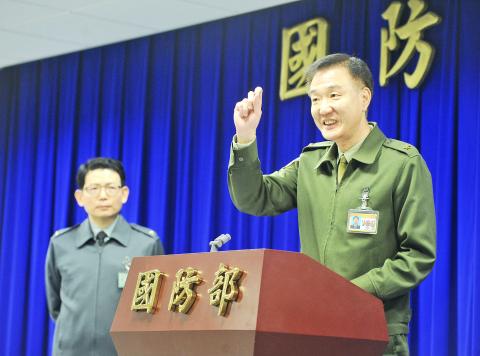The Ministry of National Defense yesterday issued a public apology over the controversy caused by military police going to a civilian’s home in connection with an investigation into the alleged online sale of classified government documents related to the White Terror era.
“The Ministry of National Defense would like to deeply apologize to the public for the concerns and uproar that the case has caused,” Political Warfare Bureau Director Wen Chen-kuo (聞振國) said during a morning news conference at the ministry. “We would also like to urge the public to discuss the matter rationally and objectively, so that the focus of the issue is not blurred.”
The ministry would ask the Control Yuan to investigate whether its Security Division or the Taipei Military Police made any administrative mistakes, and prosecutors have also been asked to investigate the matter, he said.

Photo: CNA
“There is a difference between having a document as part of a personal collection and putting it up for public auction,” Wen said. “Selling classified documents from the government’s archives could jeopardize national security and contravene the law.”
Classified documents should be placed in the care of the relevant government units or police, the ministry said, adding that the online auction of such documents is inappropriate.
Military Police Command Chief of Staff Feng Yi (馮毅), who also took part in the news conference, said that no actual search was conducted by military police officers of the civilian’s home.
“Military police received a tipoff that a man, surnamed Wei (魏), was selling classified documents online and they subsequently launched an investigation,” Feng said. “Because the probe was still in an early stage, no actions, such as applying for a search warrant, were taken.”
Posing as potential buyers, the investigators met with Wei at his home and he handed them the documents, which were stored in a damp-proof cabinet, Feng said, adding that Wei had given the officers a signed consent form before he gave them the documents.
However, Wei has said that he only handed over the documents after being threatened with prosecution for concealing them and for leaking state secrets.
Captain Chan Kuo-yi (詹國毅) of the ministry’s Security Division said that an initial probe found that Wei had sold three declassified documents online.
The documents should have been destroyed after they were declassified, but were probably smuggled out, Chan said.
Defense ministry spokesman Major General David Lo (羅紹和) told the news conference the case did not involve any Taiwanese or Chinese spies.
However, his statement contradicted remarks made on Sunday by Hsieh Ming-te (謝明德), the top political warfare officer at the Military Police Command, who told reporters that the documents in question were related to communist Chinese spies and their confessions after they surrendered to the Chinese Nationalist Party (KMT) government in the 1960s and 1970s.
Ministry officials said that Wei’s case is now being investigated by the judiciary and that the ministry would cooperate.
Five military police officers involved in the Wei investigation were summoned yesterday by the Taipei District Prosecutors’ Office for questioning. Details of the questioning were not revealed by the military police officers or the prosecutors’ office.
Additional reporting by Loa Iok-sin

ANOTHER EMERGES: The CWA yesterday said this year’s fourth storm of the typhoon season had formed in the South China Sea, but was not expected to affect Taiwan Tropical Storm Gaemi has intensified slightly as it heads toward Taiwan, where it is expected to affect the country in the coming days, the Central Weather Administration (CWA) said yesterday. As of 8am yesterday, the 120km-radius storm was 800km southeast of Oluanpi (鵝鑾鼻), Taiwan’s southernmost tip, moving at 9kph northwest, the agency said. A sea warning for Gaemi could be issued tonight at the earliest, it said, adding that the storm is projected to be closest to Taiwan on Wednesday or Thursday. Gaemi’s potential effect on Taiwan remains unclear, as that would depend on its direction, radius and intensity, forecasters said. Former Weather Forecast

As COVID-19 cases in Japan have been increasing for 10 consecutive weeks, people should get vaccinated before visiting the nation, the Centers for Disease Control (CDC) said. The centers reported 773 hospitalizations and 124 deaths related to COVID-19 in Taiwan last week. CDC Epidemic Intelligence Center Director Guo Hung-wei (郭宏偉) on Tuesday said the number of weekly COVID-19 cases reported in Japan has been increasing since mid-May and surpassed 55,000 cases from July 8 to July 14. The average number of COVID-19 patients at Japan’s healthcare facilities that week was also 1.39 times that of the week before and KP.3 is the dominant

The Chinese Communist Party’s (CCP) working group for Taiwan-related policies is likely to be upgraded to a committee-level body, a report commissioned by the Mainland Affairs Council (MAC) said. As Chinese President Xi Jinping (習近平) is increasingly likely to upgrade the CCP’s Central Leading Group for Taiwan Affairs, Taiwanese authorities should prepare by researching Xi and the CCP, the report said. At the third plenary session of the 20th Central Committee of the CCP, which ended on Thursday last week, the party set a target of 2029 for the completion of some tasks, meaning that Xi is likely preparing to

US-CHINA TRADE DISPUTE: Despite Beijing’s offer of preferential treatment, the lure of China has dimmed as Taiwanese and international investors move out Japan and the US have become the favored destinations for Taiwanese graduates as China’s attraction has waned over the years, the Ministry of Labor said. According to the ministry’s latest income and employment advisory published this month, 3,215 Taiwanese university graduates from the class of 2020 went to Japan, surpassing for the first time the 2,881 graduates who went to China. A total of 2,300 graduates from the class of 2021 went to the US, compared with the 2,262 who went to China, the document showed. The trend continued for the class of 2023, of whom 1,460 went to Japan, 1,334 went to